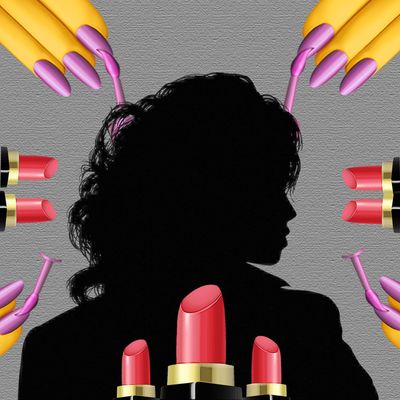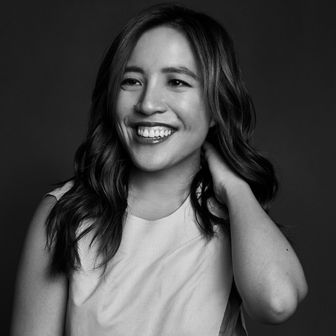
Follow Me is a weeklong series about personal brands, for better or for worse.
If you have a problem with the beauty industry, you can take it to @esteelaundry. Since the Instagram account was started about a year ago, with all its content derived from user-generated DMs and emails, it has unapologetically (and anonymously) taken beauty brands to task for offenses like bullying, lack of diversity, and cultural appropriation, among others. It was one of the first on Instagram to expose Sunday Riley for posting fake online reviews of its own products.
Almost every week I am asked the question “Who is Estée Laundry?” My answer is: I don’t know, and I don’t know anyone who does. But I did manage to get a member of the collective (@esteelaundry is run by multiple people) on the phone for an interview. Here’s more about who they are, whom the account is for, and the hundreds of DMs they receive a day.
What’s the purpose of the account?
It was first created about a year ago. We began doing cheeky things, like pointing out copycats, and now it’s evolved into something bigger. Everyone thinks the beauty industry is all glamour, but there is a dark side. We want to talk about social issues, transparency, and the lack of inclusivity and diversity in the industry.
Ultimately, we want Estée Laundry to be a platform for the consumer and our followers, where they feel safe and share their stories and concerns. As a whole, we provide a bigger voice and can stand up to brands and hold them accountable. We want to protect consumers and help them make better decisions. The dark side of beauty is big brands that put profit and revenue before the consumer. A lot of them don’t have ethical business practices. We don’t know how they’re treating their employees. The public gets glossy, pretty marketing and advertisements. We don’t see what’s happening behind the scenes.
We focus equally on emerging and established brands. Often the criticism we get from our followers is that some of the brands we call out are small and don’t have the resources to address our feedback.
How do you consider yourselves to be different than Diet Prada?
Diet Prada is a popular call out account, but we have a more curatorial approach to content. Unlike accounts like [that], we often don’t tell followers what to think, we share varying points of view from our users. Our aim is to start a conversation. Also, we are completely non-sponsored, so we don’t have any favorites. We do not endorse brands that offer us money.
Who is behind the account?
It’s a group of people located around the world. There are three co-founders. We think of ourselves as a collective. We’re all friends; we knew each other before we started the account. All of us work full-time in the beauty industry in some capacity. This is a passion project we do in our free time.
When did the account really take off?
The Sunday Riley fake-review scandal really put us on the map. We were one of the first to expose that. It got so much attention, and we got a response from Sunday Riley herself.
A month or two ago, we called out Fenty Beauty for having a disrespectful name for one of its highlighters, called Geisha Chic. We posted about it, and the brand said, “You’re right, and this is wrong.” They pulled the product from the shelves. Little things like that make it worthwhile.
Do you consider yourselves activists?
Yes. It’s a movement. We are trying to create change.
How do you obtain your content?
The majority come from DMs. We get a lot of emails as well, hundreds a day. More recently, since we’ve been talking about bullying claims at Australian beauty retailer Mecca, we’ve gotten 200-plus DMs, and they’re still coming. We read every single one, although we may not always respond. If one of us has a reservation about something, we won’t post it. We have to have a collective agreement. We also do due diligence. We try to get receipts: If something seems off and we can’t verify that the person has worked at the company they’re sending information about, then we won’t post it.
It’s easy to weed out which people are being truthful and which ones aren’t. We hear from some people who used to work at a company and are disgruntled. If one person degrades a brand, we won’t post that. If we get hundreds of stories from people sharing similar experiences, it’s probably true.
Some people message us to share a positive experience. We try to post those as well. We try to be as objective and independent as possible. We’ve never posted something and then had someone say, “Hey, that’s not true, that’s not how it is.”
Critics have said you’re a negative example of call-out culture. How do you respond to that?
It’s not our intention to create a culture of calling out brands. It’s about putting them on notice and holding them accountable. It can seem like “call-out culture” because on social media, everything is blown up. We want them to listen to what we have to say.
Do you want brands to reach out and address the problems you point out in your posts?
Surprisingly, we don’t get a lot of those. That’s the sad part. They often ignore or block us. For example, [after we posted bullying claims about the brand], Mecca has not responded at all, and they haven’t responded to any of their customers. Lots of people want to know if Mecca is going to do better and whether they’re going to develop better training. [Editor’s Note: Mecca did later respond.] We would like to open up more dialogue with brands. When we do get responses, they’re very defensive. They say, “The customers don’t know what they’re talking about.”
Why do you want to continue anonymously?
There’s no bias. We want to be as independent as possible. Being anonymous gives us more power to stand up for consumers.
Do you make any money from the account?
We have a Patreon account to which people donate. It’s very little compared to all the work that we do.
Earlier this year, you did a brief sale of @esteelaundry merchandise but were called out by your followers for certain things, including a lack of representation in the campaign. As an account that also notes when brands don’t practice diversity, what was that like?
It was an interesting learning experience for us. We uploaded the designs on Society6, which is an online merch-creation platform for creators. They don’t use real models but superimpose the designs on stock images to show what they look like. They use the same stock images for all their merch, a light-skinned model, and some followers noted the lack of diversity. We felt the criticism was valid and pulled our merch.
What are your plans for the future?
We have big plans for the account that we can’t talk about yet, and we want it to grow. We don’t rely on ads. We don’t promote product. There’s no revenue stream. We have to figure some stuff out.





